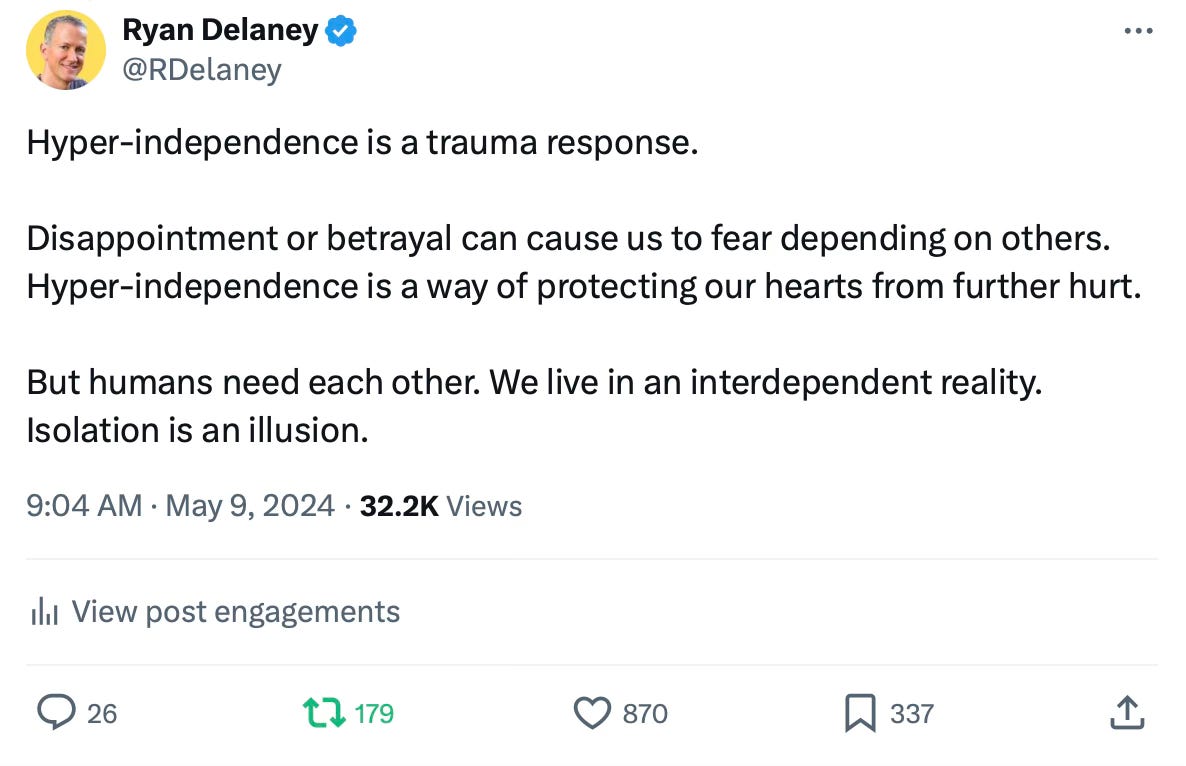Hyper Independence Is a Trauma Response
Understand the roots of hyper-independence and how to heal from within, build trust again, and live a healthier, happier life
Welcome to another edition of Beyond Self Improvement! If you missed it, here’s last week’s article: From Shy to Social: How I Learned to Engage Wisely and Avoid Heartbreak.
Today’s essay will explore the trauma response of hyper-independence and how to heal and cultivate genuine connection.
If you’re new, consider subscribing below to join our growing community and get the next essay direct to your inbox:
Dear Friend,
Today, I want to explore a topic that has resonated deeply with many: hyper-independence. You may have seen my recent tweet about this. Given the overwhelming response, I’d like to explore this concept in greater detail.
Hyper-Independence: A Trauma Response
Hyper-independence is a term that has gained traction in the mental health and trauma community. Simply put, hyper-independence refers to an extreme form of self-reliance where an individual (including myself) avoids depending on others, even when it might be beneficial or necessary. This behavior is often rooted in past experiences of disappointment or betrayal.
When we are let down or hurt by those we trust, it can leave deep scars. These experiences teach us that relying on others is risky and that the pain of betrayal or disappointment is something we never want to experience again. As a result, we develop a protective mechanism: hyper-independence. This allows us to shield our hearts from potential future harm by keeping others at a safe distance.
The Illusion of Isolation
Despite our efforts to protect ourselves, humans are inherently social beings. We are meant to live in connection with others. Isolation, while it might feel safe, is ultimately an illusion. Our lives are interwoven with the lives of others in profound ways, and our well-being is often tied to the quality of our relationships.
The irony of hyper-independence is that while it aims to protect us from hurt, it can also prevent us from experiencing the profound joy and support that come from meaningful connections. When isolating ourselves, we miss the richness of shared experiences. We forego the comfort of mutual support. We deny ourselves the growth that comes from collaborative efforts.
The Power of Interdependence
Interdependence, as opposed to hyper-independence, acknowledges that while we are capable individuals, we are also more satisfied and healthier when we rely on one another. It’s about harmonizing our need for autonomy with our need for connection. Interdependence allows us to maintain independence while recognizing that leaning on others is not only okay but a cornerstone of well-being.
In an interdependent relationship, both parties give and receive support. This mutual reliance fosters trust, deepens bonds, and creates a sense of partnership and community. It’s a recognition that we don’t have to face life’s challenges alone and that sharing our burdens with trusted individuals can strengthen us and enrich our lives.
Healing Through Connection
If you recognize hyper-independence in yourself, know that healing is possible. Here are a few ways that have helped me move toward a healthier, more interdependent way of living:
1. Acknowledge your trauma. If you’re human, you have trauma, or if you prefer, conditioning or what Don Miguel Ruiz refers to as domestication. The first step in healing is acknowledging past experiences leading to hyper-independence. Understanding the root cause can provide valuable insight and pave the way for healing. The more you heal, the less you feel threatened by others, and the more you long to connect.
2. Practice vulnerability. When the people you depended on weren’t there for you, you lost trust. Allowing yourself to be vulnerable can be incredibly difficult, especially if you’ve been hurt before. Start small by sharing your thoughts and feelings with someone you feel safe with. Over time, this can help rebuild your capacity for trusting and relying on others.
3. Seek support. Therapies like psychodynamic, somatic, psychodrama and EMDR can be invaluable in healing from trauma. A professional can provide guidance and support as you navigate your path back to interdependence.
4. Build trust gradually. Rebuilding trust takes time. Start by leaning on others for small things like asking for directions, requesting someone hand you a spatula in the kitchen, or talking with a friend about a difficulty. Gradually increase your level of dependence as your comfort grows.
5. Cultivate self-compassion. Above all, be gentle with yourself. Healing is not a linear process, and taking small steps is okay. Celebrate your progress and forgive yourself for any setbacks.
Moving Forward
Hyper-independence may have served as a shield to protect you as a child. But as an adult, it becomes a barrier to genuine connection and growth. By embracing interdependence, you align yourself with the laws of life.
Remember, humans need each other. Our reality is interconnected. Strength, resilience and joy are found through healing and connection. By acknowledging trauma, practicing vulnerability, and seeking support, we can move towards a healthier, more connected way of living.
Keep healing,
Ryan
Thank you for walking beside me on the path of self-acceptance and for joining the conversation. I’m glad you’re here.
My biggest passion is working 1:1 with readers like you.
Whenever you’re ready, I can help you stop waging war with yourself and start being your best friend. Schedule a free, 45-minute discovery call now.





This piece is powerful as it identifies something I know about myself but have chosen to ignore. As I grapple with recovery from addiction, I have tried to lean in and build relationships. But more than one person suggested I need to be more vulnerable, open, and honest in my sharing. "Come in, sit all the way down," and allow the process to unfold. That, however, is entirely counter to my intuition, which is to keep a distance, be cautious, and keep things close. I'll bring this topic up with my therapist this week, but I want to thank you for helping me identify and name this part of my self.
You've brought an important topic for us to make our lives better. Initially life is built on interdependence because we cannot live without each other. We are complete with our relationship with others.
Truama is part of life because almost everyone passes through it. Through interdependence we can show our vulnerability thereby paving way for healing because when we share our troubles with others it relives us of our pain especially when we listen and empathize with us. Lovely steps you gave